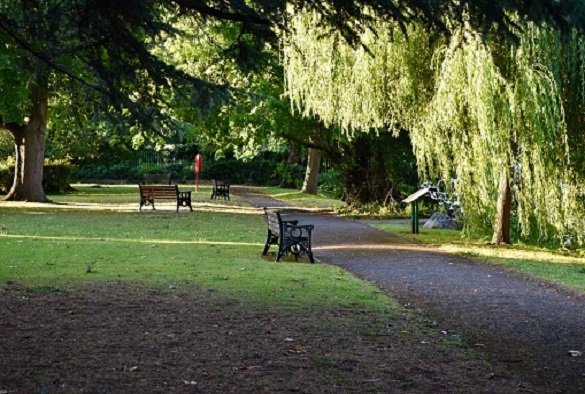Linking the health of nature in towns and cities to our own health and wellbeing
Published on

A new research network involving the University of Liverpool aims to discover more about how the quality of our urban parks, gardens, rivers and canals can affect the health and wellbeing of the people living around them.
The benefits of green spaces and waterways in our towns and cities have been thrown into sharp focus over the last couple of years as people sought out nature to cope with the pandemic.
The pandemic also highlighted inequities in people’s ability to access nature and the natural world. Although some communities have easy access to nature through their own gardens, allotments or local parks, others, particularly during public health restrictions, are confined largely to their homes or densely built environments.
Access to the natural world has long been associated with having benefits to our health and wellbeing but, despite urban areas now being where most people around the world now live, relatively little is known about how the quality of these urban ecosystems matter, and how that can affect health benefits.
Funded through the Natural Environment Research Council (NERC) part of UK Research and Innovation (UKRI) and involving researchers from the University of Liverpool and Lancaster University, this new network will create and catalyse a community of experts across a range of disciplines, including environmental scientists, health experts, psychologists, social scientists, urban planners, designers, businesses, community groups and policy makers.
Through series of workshops and proof-of-concept studies, the ‘Quality of Urban Environments with Nature-Connectedness and Health’ (QUENCH) network will explore the differing quality of urban nature, be that its soils, pollution levels, size and biodiversity, and how this links to nature-connectedness and health.
Their aim is to discover more about how the quality of our urban parks, gardens, woods, food-growing spaces and waterways influences the connections we feel to nature, and the knock-on effects for health and wellbeing, helping to inform the future management and planning of natural spaces in our towns and cities.
Professor Jessica Davies, Principal Investigator on the QUENCH project from the University of Lancaster, said: “Our experiences through the pandemic have highlighted the importance of connecting with nature. Lots of people sought out and visited natural environments, like parks and woodland, near where they lived, and felt better for doing so. There’s lots of good science too that demonstrates the health and wellbeing benefits of connecting with nature.
“However, we need to know more about how the health of the ecosystems themselves matters for our health and wellbeing. Towns and cities are the fastest growing habitat on Earth, and urbanisation has huge effects on the spatial layout of ecosystems, the species that reside in them, and the local climate and pollutants they experience. We need to understand how all these human-influenced conditions affect ecosystem health, and what, in turn, are the consequences for how we experience those environments and nature.”
Co-investigator, Dr Mark Green a Senior Lecturer in Health Geography at University of Liverpool, stressed that it’s also about inequalities: “Given that urban areas are also often where greater levels of ill-health can occur it is important to find out how green and blue urban spaces can be better used to tackle health inequalities and create fairer societies.”
Dr Charlotte Hardman, co-investigator from University of Liverpool's Department of Psychology, added: “QUENCH is about finding ways in how researchers and practitioners who work in very different fields – from psychology, to environmental sciences, to public health – can work together to find practical solutions that help people better connect with nature throughout urban places to tackle health inequalities.”
QUENCH has received £312,000 funding from the Natural Environment Research Council, part of UKRI. It builds on research in the UKRI funded Rurban Revolution project that examines the health, sustainability and resilience benefits of expanding urban food production.
Researchers involved in QUENCH include Dr Charlotte Hardman and Dr Mark Green from the University of Liverpool and Professor Jessica Davies, Professor Jo Knight, Dr Rachael Marshall and Dr Andy Yuille from Lancaster University,